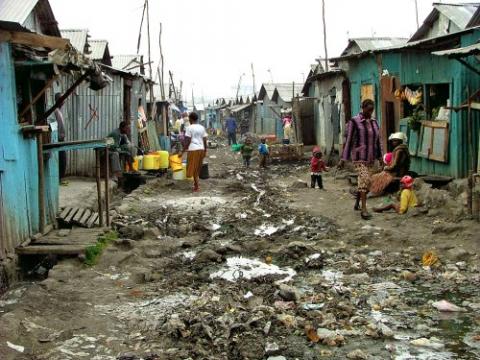Human Rights and Free Trade

50,000 people a day die from poverty related causes. 22,000 of these fatalities are children under the age of five. The current global financial and food crises have greatly aggravated the plight of the world's most impoverished and vulnerable people. The United Nation's Food and Agricultural Organisation (FAO) estimates that these international instabilities resulted in a massive increase of over 11% between 2009 and 2010 - 915 million to 1.02 billion - in the number of chronically hungry people.
Although poverty and hunger are recognised as critical social and economic ills, they are not regarded as human rights violations in themselves. Most economists and many development experts believe the key to tackling poverty lies in economic growth. To improve the living conditions of the poor, they argue that greater free trade should be promoted at the global level. They hold that the failure to adequately integrate the South (Southern Hemisphere) into the world market lies at the root of its continued widespread poverty.
However, despite two decades of rapidly increasing open markets and significant growth in trade volumes in the South, the significant increase in exports has failed to add significantly to their income. Moreover, while global poverty has decreased in overall terms, this has been achieved by China and India with the rest showing a slight increase.
The contemporary free trade model has been widely criticised for preventing states in the South from introducing economic reforms suitable to their own growth and poverty-reduction needs. The 'one size fits all' open market approach drastically curtails their development policy options. Ironically, when nations such as Britain and the US were industrialising, they nurtured their nascent domestic enterprises by imposing tariffs and other interventionist economic policies. These options are mostly denied to the South today.
The growth in free trade has now widened the global inequality divide, as it continues to rise not only between states but also within states. The 2005 UNDP Human Development Report revealed that the income of the richest 50 individuals was greater than the poorest 416 million. The 2.5 billion living on US$2 a day (40% of the world's population) accounted for 5% of global income - less than ⅟10 of the 54% reaped by the richest 10%. These divergences in income and wealth continue to grow and are without historical precedent.
There is therefore clearly a need for political intervention to tackle the massive and accelerating gap between the haves and the have-nots. However, can human rights, such as economic and social rights, play a role in this process?
Makau Mutua, the dean of Buffalo Law school, argues that the international awareness and moral weight of human rights might enable their application as a means to facilitate global initiatives to tackle poverty, hunger and inequality. The pioneering work of the NGO 3D in promoting improved access to patented medicines by applying human rights rules and mechanisms serves as a possible example of how such an approach might work. However, the closure of 3D due to a lack of funding illustrates the difficulties faced by any organisation trying to promote human rights, particularly in the area of free trade. The reality is that human rights considerations are unlikely to receive anywhere near the same political weight or backing as free trade.
Furthermore, the reduction in policy flexibility imposed upon the South through free trade agreements frequently undermines their ability to comply with their human rights obligations. In this respect, trade rules should be evaluated in terms of their human rights impact. At the same time, international human rights rules and accountability mechanisms need to be assessed to see if they are capable of reducing the negative impact of trade rules on the enjoyment of human rights. Where they are found wanting, they should be amended to provide the required human rights protection.
Even when states in the South are genuinely committed to fulfilling the human rights of their citizens, they often lack the resources, both financially and institutionally, to do so. They therefore regularly depend upon the 'goodwill' of the North (Northern Hemisphere) to help them realise their human rights' obligations. Many states in the North have used this leverage to advocate for human rights measures favourable to their trading objectives while watering down or obstructing those inimical to free trade. This self-serving abuse of human rights on the part of the North was revealed by the WikiLeaks revelations that Washington has been funding NGOs in Venezuela that are purportedly promoting civil liberties and human rights but in actuality serve as a cover for anti-Chavez groups.
Arguably the most important criticism of human rights is their unsuitability for dealing with the global inequities that exist, given their deep rootedness in the systems that created such inequalities in the first place. Can human rights ever offer a genuine way of enabling the South to develop their own ways of addressing the issues of poverty, hunger and inequality? Or are they just another 'policy straitjacket', through their presupposition of a certain type of society or "level of social development", thus limiting the South's socio-economic development options?
If human rights are to be considered as a potential weapon in the struggle to overcome global poverty and inequality, it will be necessary to - at the very minimum – establish realistic, clearly defined and measurable progress goals. This would enable the definition and implementation of substantive and trackable actions to mitigate the worst excesses of free trade and improve the fulfilment of the human rights and the status of the world's poor.
